December of Social Responsibility: when the university opens itself to the community

December brought Universidad Europeia de Lisoboa a clear roadmap of commitment to the community: bringing academia closer to people, creating tangible opportunities, and honoring the culture that defines us. In just a few days, two local protocols were signed – with the Loures City Council and with the Casa do Artista, in Carnide – and the European University’s Volunteer Pool was presented, a new channel for student participation with direct impact on the territory. Both protocols were signed on behalf of the European University by the Rector, Professor Dr. Hélia Gonçalves Pereira, underscoring the institution’s leadership and long‑term commitment. The guiding principle is simple and demanding: serve, innovate, and transform. Loures: Upskilling that turns into opportunity The partnership with the Loures City Council aims to open doors for those who want to study and progress, aligning education with local development. The protocol provides facilitated access to higher education via scholarships for municipal employees, and the integration of students into curricular and professional internships – concrete steps to connect talent with the real needs of the municipality. More than administrative cooperation, it is a platform for joint projects with academic, social, and economic impact, and for promoting innovation, research, and new approaches to public management. In practice, Loures gains more skills and future; the University gains a living laboratory to apply knowledge and generate solutions with measurable effects on the territory. Carnide: Culture that cares for memory and unites generations On December 4, the European University and the Casa do Artista (Apoiarte Association), in Carnide, formalized a protocol that brings the academic community closer to the senior artistic community – in a moment attended by the actor José Raposo, the institution’s president. The collaboration foresees reading sessions, research projects, cultural initiatives, and actions with real impact on residents’ quality of life. By joining the project “O meu lugar no Teatro Armando Cortez”, the European University also assumes an affective and memory-based commitment: contributing to the preservation of the legacy of Portuguese artists, while creating intergenerational meeting spaces where culture is bridge, care, and citizenship. Volunteer Pool: participation that is felt on the ground To amplify this movement of proximity, the European University officially launched its Volunteer Pool (Bolsa de Voluntariado) – presented by the Vice‑Rector for Academic Life, Professor Dr. Sara Sousa. The Pool is a structured participation channel that allows students to get involved in social, cultural, and educational initiatives, with direct benefit for partner communities. More than volunteer hours, it is purposeful learning: developing transversal skills (communication, empathy, teamwork, leadership), strengthening the academic path, and gaining transformative experiences that leave a mark – in Loures, at the Casa do Artista, and in future partnerships that may emerge from this ecosystem. The essentials: upskilling with an open door, culture that cares for people, and volunteering with impact. This is how the European University lives social responsibility – on and off campus. This was a December of alliances and action, marked by two protocols that connect the University to the territory and a Volunteer Pool that brings to life the will to participate and transform. Thus, the European University reaffirms its mission: to learn, innovate, and serve – with students at the center of change.
Mental Health at the Centre: M.A.R.K.E.T. MEET-UP at UEL
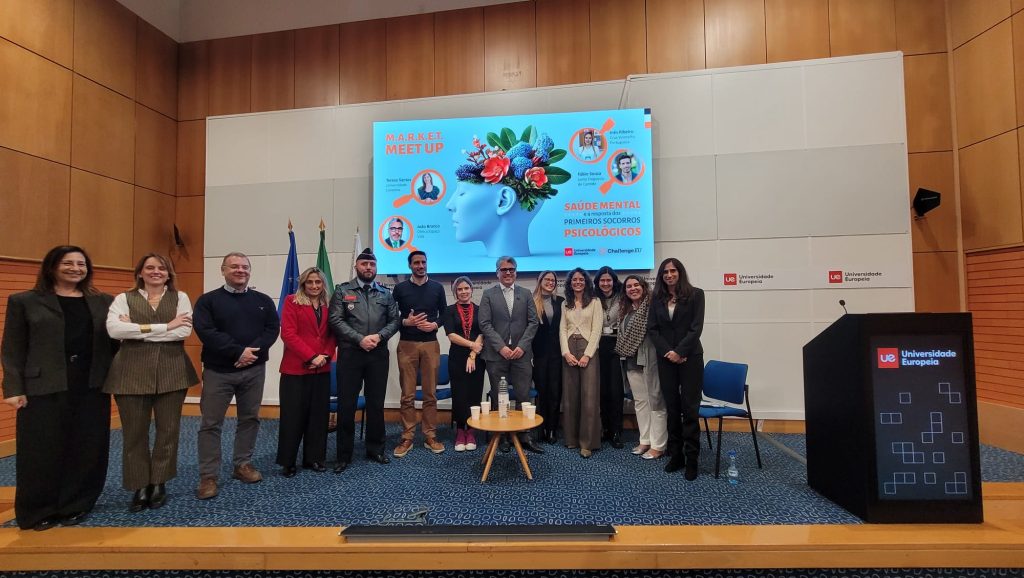
On 4 December, Quinta do Bom Nome, one of Universidade Europeia’s campuses in Carnide, hosted a vibrant gathering that brought together 50 participants: partners in the ChallengeEU Alliance, academia (academic staff, administrative staff and students), civil society, political decision-makers and economic actors. The group engaged in a frank, action-oriented conversation on mental health and psychological first aid (PFA). Opening remarks were delivered by Dr Rita Freitas, ChallengeEU Chief Implementation Officer at Universidade Europeia. She framed the Quadruple Helix model as a collaborative framework that brings together academia, government, civil society and the economy to reflect on shared challenges and design practical solutions across the initiative’s three Smart Specialisation Areas: Health & Well-Being, Smart Digitalisation and Sustainable Futures. Professor Dr Sofia Lopes hosted the event throughout the day, ensuring smooth transitions between segments and speakers. The roundtable was moderated by Professor Dr Lisa Roque, a member of the ChallengeEU community and a psychology faculty member, who placed PFA at the centre of the discussion and emphasised the need to build capacity to respond competently when someone experiences a critical event. Quadruple Helix in action The conversation gained depth as representatives from each “vertex” of the helix sat side by side. On behalf of academia, Prof Teresa Santos, Dean of the Faculty of Health Sciences, underscored the importance of mental-health literacy and transversal training – integrating competencies such as active listening, emotional regulation and crisis management into curricula and professional development programmes for students, faculty and staff. Representing civil society, Dr Inês Ribeiro of the Portuguese Red Cross highlighted the importance of timely responses and certified training in PFA, especially in crisis contexts, and the value of normalising these care practices as part of collective preparedness. From the local economy, Dr João Branco of Clínica Espaço Vida – Clínica Médica shared an integrated clinical perspective (general practice, psychiatry, nutrition and psychology), emphasising the link between prevention, triage and referral, as well as the value of accessible protocols connecting campus services, community support and specialised follow-up. The political dimension was represented by Fábio Sousa, Vice-President of the Carnide Parish Council, who explained how the council engages with local residents and stressed the importance of shared involvement – building proximity, networks and collective responsibility as pillars of an effective public response. Regional voices join the dialogue In a second round, the dialogue opened to regional stakeholders, reinforcing the reach of the model and the commitment to translate intentions into consistent practice. Firefighter Miguel Pereira, from the Sacavém Volunteer Firefighters, brought frontline experience, showing how early emotional and behavioural responses can make a tangible difference in mitigating harm and guiding decisions under pressure. Pedra Base – Consulting & Training, represented by Sara Carvalha and Daniela Guerreiro, presented first-aid training solutions for the corporate sector, advocating the implementation of internal protocols, response plans and ongoing team capacity-building. From expertise to practice: building mental-health literacy and response capacity A key takeaway resonated throughout the day: anyone can provide psychological first aid – provided they have the competence to do so. In many settings, equipping communities with PFA skills can help address shortages in resources and existing capacity, strengthening empathy, mutual support and immediate responses to critical events – alongside physical first aid when necessary. This shared vision turns the campus into a living laboratory of solutions, with impact both within and beyond the university. The closing segment opened the floor and turned the gathering into a productive brainstorming session, generating proposals that set direction and ambition: PFA modules embedded in curricula and continuous training; campus response plans and referral protocols aligned with local partnerships; mental-health literacy campaigns combined with hands-on skills training; and monitoring and impact-evaluation mechanisms grounded in data and continuous improvement. It became clear that Universidade Europeia and ChallengeEU are taking the concept off the page and into practice: when academia, civil society, political decision-makers and the economy sit at the same table – with informed moderation, careful hosting and shared objectives – the outcomes can be applicable, replicable and sustainable. More than a debate, this meet-up marked a turning point: empowering people to act with competence and care, precisely when it matters most.
Public Engagement and Volunteer Fair: applied science and civic participation
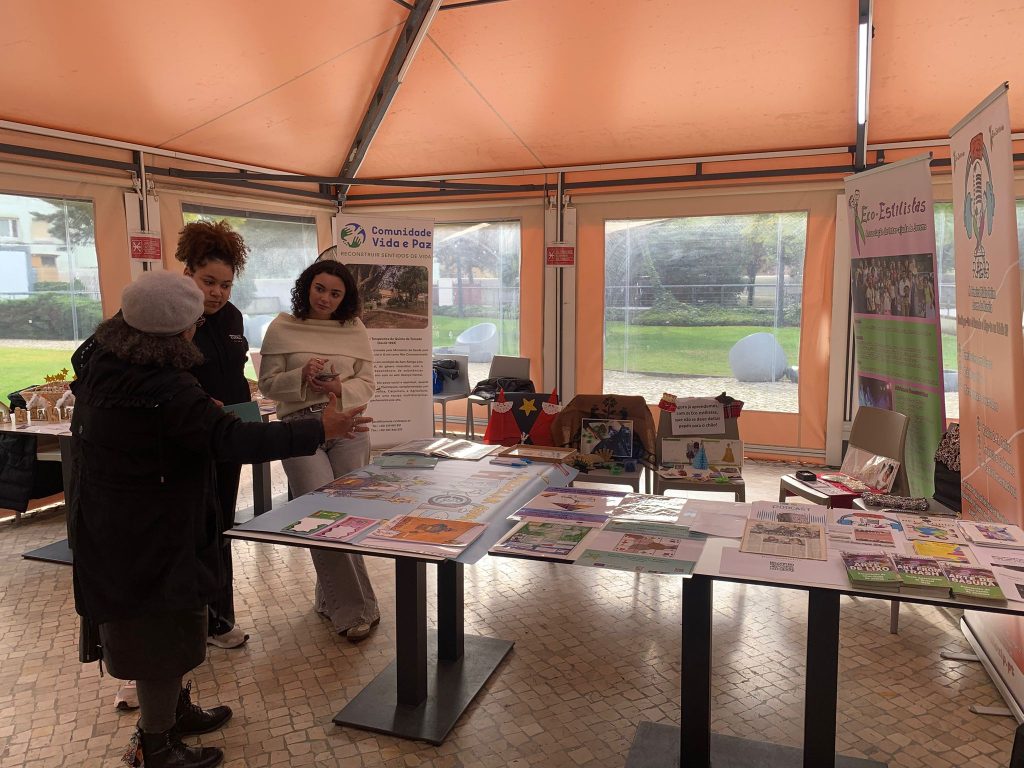
On 4th December, at the Universidade Europeia de Lisboa was held Public Engagement and Volunteer Fair event. Throughout the day, around 100 people moved through the university’s common space on the Carnide campus, engaging with stands, student‑led activities, and volunteer networks. The occasion included the launch of the Universidade Europeia’s Volunteer Scholarship and spotlighted the scientific poster presentation of results from the ODEI TRAINING COURSE – a pilot held from 23 to 27 June 2025. The poster was presented by Professor Rebeca Rocha and Dr. Rita Freitas, Chief Implementation Officer of Universidade Europeia in the ChallengeEU alliance. Universidade Europeia is the lead university for the ODEI theme and has been working in this area with the eight other universities that make up ChallengeEU. In the presentation of the poster “DEI Awareness – A Pilot Course Assessment,” Universidade Europeia placed applied science at the heart of the conversation, offering a clear, rigorous account of a pilot that is already transforming practice. The ODEI (Openness, Diversity, Equity & Inclusion) training has evolved into an annual offering for students and staff across the nine universities in the alliance. The poster succinctly and coherently outlined the course’s pedagogical architecture: six modules delivered over 12 hours, blending theoretical framing with practical applications and reflective activities. The modules cover the essential spectrum of DEI capacity‑building – Introduction to DEI, Self‑Awareness & Unconscious Bias, Intersectionality & Inclusion, Inclusive Communication, Neurodiversity & Accessibility, and From Awareness to Action – aligning concepts, skills, and transfer to real‑world contexts. The hybrid format (in‑person and online), with group/project work, was highlighted as a driver of accessibility and engagement, enabling 46 participants (staff and students) from partner institutions to experience the content in diverse, collaborative settings. “As a journalist specialized in scientific communication, I underscore the care taken with the learning objectives, clearly mapped to observable outcomes: understanding key concepts (such as unconscious bias, intersectionality, and neurodiversity), critically reflecting on personal bias and its impact on professional practice, demonstrating inclusive communication practices, and designing actionable strategies to strengthen institutional DEI. This taxonomy of objectives reveals a course aimed at behavioral and organizational change, moving beyond awareness into implementation,” says Dr. Rita Freitas. In the evaluation section, the poster presented a bar chart across six dimensions – Relevance, Engagement, Materials, Knowledge, Methods, and Overall – showing consistently high participant satisfaction in all metrics. While explicit numerical values were not displayed, the consistently high profile of the results suggests robust perceived quality and coherence between pedagogical design and classroom experience. This is a crucial indicator for decisions on scaling and institutionalization. Scientific rigor was equally evident in the continuous improvement section. Based on pilot data, the ChallengeEU DEI team – comprising the nine universities and led by Universidade Europeia – introduced specific adaptations: in Module 1, a stronger focus on key definitions to consolidate a shared language; in Module 2, the inclusion of more real cases, bringing content closer to everyday challenges; in Module 3, additional support materials to diversify learning strategies; in Module 4, adjustments to neurodiversity content for greater precision and breadth; in Module 5, the removal of the gender‑sensitive language topic – a technical decision reflecting careful scope curation; and, in Module 6, changes to activity duration to optimize the balance between practice and synthesis. Notes on timing (such as setting 1h30–2h for Module 1 and revising Module 2 from 3h to 2h30) reinforce that the course is iterative, attentive to cognitive load and the optimal learning pace. In summary, the poster’s narrative delivered what one expects from effective scientific communication: clarity of exposition, methodological transparency, evidence of results, and plans for improvement. By transforming a pilot into an annual program, Universidade Europeia and ChallengeEU signal a vision of ODEI as a practical competence – to learn, apply, measure, and improve – and offer a replicable model that brings knowledge and action closer together, both on campus and beyond. For those who attended the poster presentation, the takeaway was clear: ODEI Training is not just a course; it is an evidence‑based instrument of change, ready to impact people, teams, and institutions.
CBL Training Days at Universidade Europeia in Lisbon
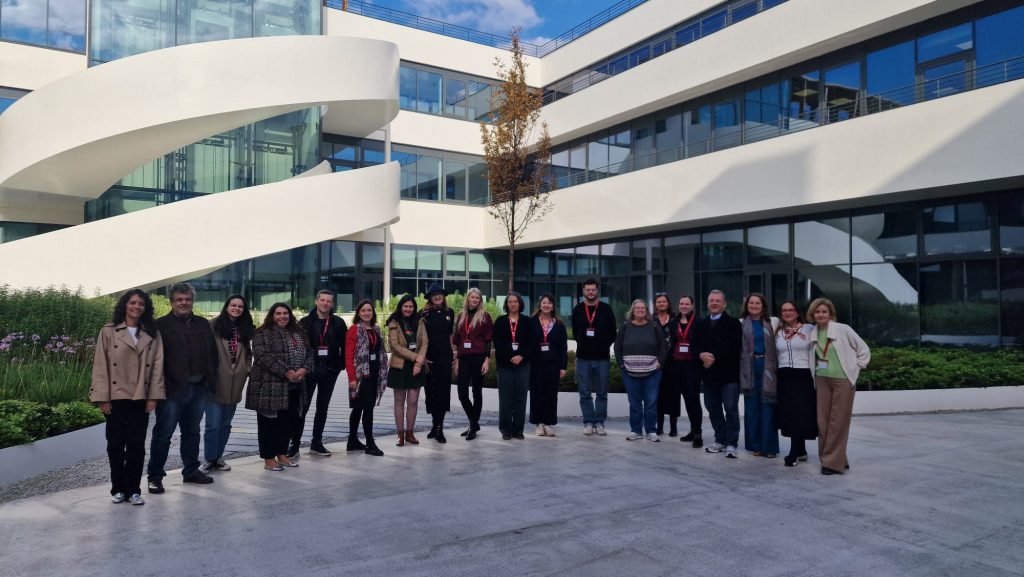
Under a bright winter sun and crisp Lisbon air, Universidade Europeia hosted the CBL Training Days on November 27 and 28, bringing together more than 40 participants from the 9 universities of the ChallengeEU Alliance. The mission was clear: to deepen the practice of Challenge-Based Learning (CBL) and strengthen cooperation among European institutions to transform education. The first day took place at the historic Quinta do Bom Nome, starting with a hybrid opening session in the Sala de Atos. Rector Prof. Dr. Hélia Gonçalves Pereira welcomed participants, followed by Prof. Dr. Rodrigo Morais, who introduced the Academic Model for Sustainability. The afternoon featured the CBL Challenge, led by Prof. Dr. Sara Gancho, and concluded with an immersive experience in simulation-based learning with actors, moderated by Professors Frederico Raposo and Sofia Lopes, turning disciplinary problems into opportunities for practical reflection. On the second day, the event moved to the modern Oriente Green Campus, where advanced CBL strategies were explored with Professors Cidália Neves, Sandra Oliveira, and Sofia Santos, who shared real success stories, including cases from IPAM Porto and projects with APPDCI, a partner entity of the ChallengeEU Alliance that promotes inclusive and sustainable practices. The program continued with a hands-on workshop using real cases, led by Prof. Dr. Rodrigo Morais, and a session on research-based learning, conducted by Prof. Dr. Joana Ramalho. The closing session, led by Vice-Rector Prof. Dr. Paulo Vieira, highlighted the next steps to adapt learning to the ChallengeEU project, during a networking moment that reinforced a shared ambition: to transform education through collaboration and innovation. “During the training, we learned how to apply the CBL method in practice, how to integrate it into the content of different courses, and how several courses or subjects can be combined into a single joint project based on practical solutions,” explains Prof. Agnieszka Jaszczak, Head of the Department of Landscape Architecture at the University of Warmia and Mazury in Olsztyn. She also notes that the training offered an opportunity to examine the project development process – starting from the selection of a partner, such as a company for which a solution is being designed. “I was particularly interested in projects developed within design programmes due to their close connection with my own field of work – architecture, landscape and spatial planning. I was impressed by the excellent, modern infrastructure, including laboratories, graphic, artistic, photographic and computer studios available to students not only during project work but also after classes. I was also struck by the university campus, with its beautiful architecture and green spaces,” adds Prof. Agnieszka Jaszczak. During the event, Professor Agnieszka Jaszczak also promoted the ChallengeEU summer school entitled “Traces in the Landscape,” which will take place next year at the Department of Landscape Architecture at the University of Warmia and Mazury in Olsztyn. The school will bring together students and doctoral candidates from the nine universities forming the Alliance. Its aim is to deepen participants’ knowledge and sensibility in identifying, interpreting and protecting traces present in the landscape – cultural, natural and aesthetic. The CBL Training Days were not just an academic event – they were a living laboratory of ideas, where theory and practice came together to build concrete solutions for the challenges of the future.
ChallengeEU Collaboration Powered by Lab IDEAS BIP

The ChallengeEU Alliance continues to promote collaboration and innovation through the Lab IDEAS: Impact-Driven Education for Action and Sustainability Blended Intensive Program (BIP), organized by IADE – Faculty of Design, Technology and Communication of Universidade Europeia, one of the founding institutions of the alliance in Lisbon, Portugal. The programme, held under Erasmus+, gathered 51 participants, including 36 international travelling participants from partner universities. Among them were students and professors from two ChallengeEU institutions, Latvia University of Life Sciences and Technologies and the University of Warmia and Mazury in Olsztyn, who joined multidisciplinary teams to co-create innovative solutions addressing digital behaviour and social responsibility. Under the theme “Designing Safe Digital Communities”, and in collaboration with the Portuguese Public Security Police (PSP), participants explored how social design can help prevent cyberbullying, foster empathy, and promote safer and more inclusive online environments. Students proposed a range of solutions, including ideas for board games for children and teenagers, creating a website to support victims, and developing informational materials for professionals involved in bullying prevention in cooperation with the police. They also drafted the idea of establishing an association that could later evolve into a social movement. As explained, this could help raise awareness of bullying in society and schools and contribute to creating a safe environment where victims can receive practical and psychological support. All of these solutions were presented to representatives of the police in Lisbon. “The concept of this programme really appeals to me. It was four days of intensive work with a tangible outcome at the end (presented to the client) — that’s exactly what we, students of Trend Analysis and Creation, enjoy. I’m very glad we have the opportunity to take part in initiatives like this. I’d happily do it again,” says Dominika Staniszewska, a student of Trend Analysis and Creation at University of Warmia and Mazury. Wiktor Kotarski, who also studies at UWM, adds:“I think the idea is excellent because it lets us look at what we’ll be doing professionally from a completely different perspective. Another advantage is that it allows you to test yourself in a new, international environment. In my view, the intensity is a plus – in a short time you can see whether this kind of work is for you. And if you decide it isn’t, you haven’t lost much time.” “Because we worked in mixed groups, we were able to experience intercultural exchange. Every student brought something new to the project — for example, a different way of thinking or acting. My colleague and I encouraged our teammates to use design-thinking methods, which is how we work at UWM. We exchanged knowledge, which was both pleasant and instructive,” says Dominika. The meeting in Lisbon was a valuable experience not only for the students but also for their accompanying supervisors. For example, Prof. Līga Paula (LBTU) noted that taking part in the mobility programme was an excellent opportunity to gain experience in organising BIPs, establish new contacts, and exchange insights with international colleagues. Through this initiative, the ChallengeEU Alliance reinforces its commitment to interdisciplinary learning, mobility, and social impact, empowering students and educators to transform real-world challenges into opportunities for positive change.
ODEI Programme in Action
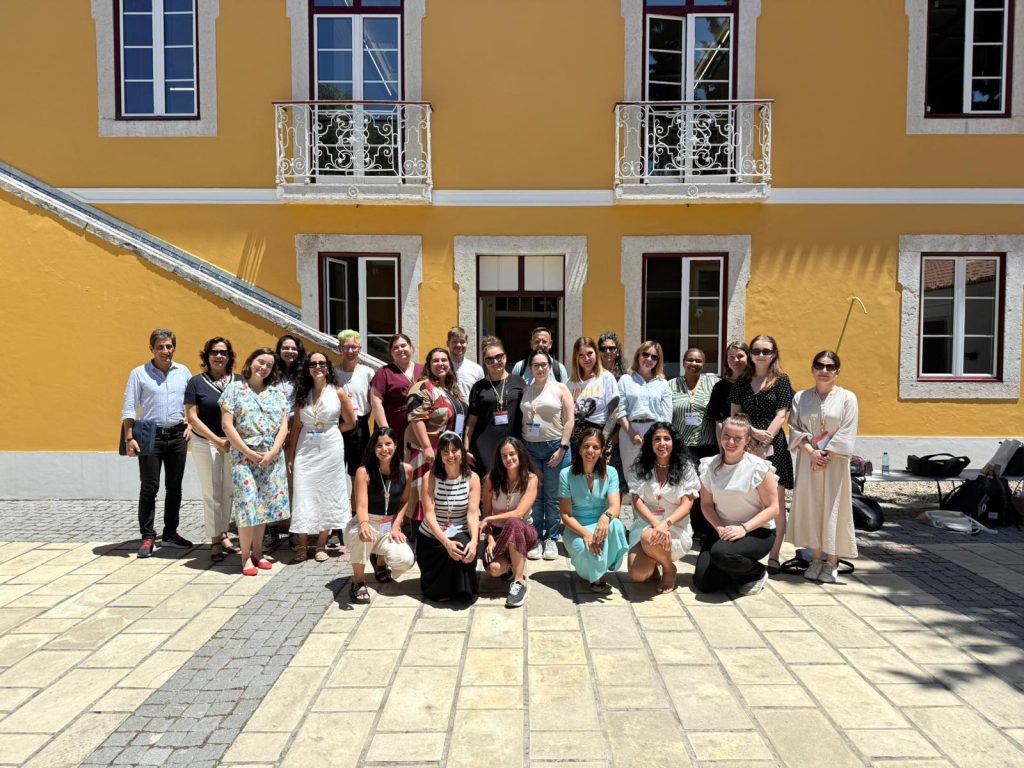
From June 20 to 30, members of Work Package 5 from the ChallengeEU Alliance conducted an innovative pilot training on Openness, Diversity, Equity, and Inclusion. The immersive Blended Intensive Programme (BIP), hosted by Universidade Europeia, brought together participants from all partner universities, offering a unique opportunity to develop and refine their teaching skills on key ODEI topics. After several weeks of in-depth preparation, the training provided a dynamic platform to put their knowledge into practice. The training was structured into six interactive modules, each addressing key aspects of ODEI: A standout feature of the training was the ODEI simulation, where participants engaged in experiential learning by observing actors role-playing real-life scenarios involving discrimination and microaggressions. This powerful exercise sparked deep discussions, allowing attendees to analyze these situations and collaboratively explore solutions. While the opening and closing sessions were held online, the core of the training took place in a hybrid format, combining virtual participation with an in-person gathering in Lisbon, Portugal. This blended approach not only made the program accessible to a wider audience but also provided an invaluable opportunity for participants to network, exchange ideas, and strengthen cross-university partnerships. The training employed diverse, interactive methods – including experiential learning, Mentimeter polls, group discussions, and brainstorming sessions – to ensure active participation. The final evaluations reflected high satisfaction with the content, materials, and facilitation methods, demonstrating the program’s effectiveness in deepening ODEI competencies. Building on this successful pilot, the next phase will involve rolling out the training to students and staff across all ChallengeEU universities. This expansion will further embed ODEI principles into institutional cultures, empowering more individuals to champion inclusivity and equity in their communities. This initiative marks a significant step forward in creating more inclusive, aware, and collaborative academic environments – a testament to the power of shared learning and collective action.
Let’s Talk ODEI in Academia!
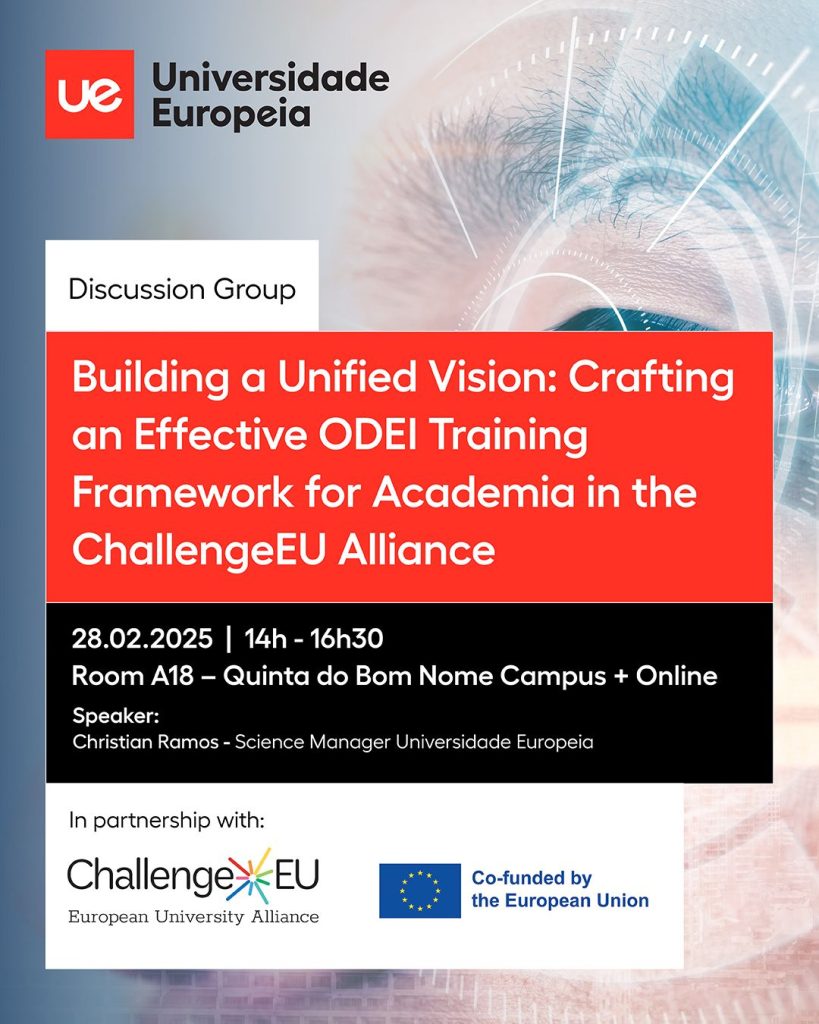
Universidade Europeia is hosting a hybrid discussion forum on February 28th at 14:00 (UTC +0), focused on Building an Effective ODEI Training Framework for Academia. This event is will address critical issues around Diversity, Equity, and Inclusion in higher education. Topics up for discussion: 🔹Establishing Educator Competencies for DEI 🔹Top-Down Meets Bottom-Up: Aligning Strategy with Implementation 🔹Defining Key DEI Topics for Academic Training 🔹Institutional Support & Faculty Engagement 🔹Creating Flexible and Scalable Training Models 🔹Measuring Effectiveness & Ensuring Continuous Improvement Join: https://tiny.pl/7rz4y-cx

